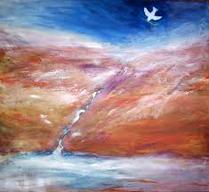
- Ann Weems (adapted)
Reading:
So Jesus left the Judean countryside and went back to Galilee. To get there, he had to pass through Samaria. He came into Sychar, a Samaritan village that bordered the field Jacob had given his son Joseph. Jacob’s well was still there. Jesus, worn out by the trip, sat down at the well. It was noon. A woman, a Samaritan, came to draw water. Jesus said, “Would you give me a drink of water?” (His disciples had gone to the village to buy food for lunch.) The Samaritan woman, taken aback, asked, “How come you, a Jew, are asking me, a Samaritan woman, for a drink?” (Jews in those days wouldn’t be caught dead talking to Samaritans.) Jesus answered, “If you knew the generosity of God and who I am, you would be asking me for a drink, and I would give you fresh, living water.” The woman said, “Sir, you don’t even have a bucket to draw with, and this well is deep. So how are you going to get this ‘living water’? Are you a better man than our ancestor Jacob, who dug this well and drank from it, he and his sons and livestock, and passed it down to us?” Jesus said, “Everyone who drinks this water will get thirsty again and again. Anyone who drinks the water I give will never thirst—not ever. The water I give will be an artesian spring within, gushing fountains of endless life.” The woman said, “Sir, give me this water so I won’t ever get thirsty, won’t ever have to come back to this well again!” He said, “Go call your husband and then come back.” “I have no husband,” she said. “That’s nicely put: ‘I have no husband.’ You’ve had five husbands, and the man you’re living with now isn’t even your husband. You spoke the truth there, sure enough.” “Oh, so you’re a prophet! Well, tell me this: Our ancestors worshiped God at this mountain, but you Jews insist that Jerusalem is the only place for worship, right?” “Believe me, woman, the time is coming when you Samaritans will worship the Father neither here at this mountain nor there in Jerusalem. You worship guessing in the dark; we Jews worship in the clear light of day. God’s way of salvation is made available through the Jews. But the time is coming—it has, in fact, come—when what you’re called will not matter and where you go to worship will not matter. “It’s who you are and the way you live that count before God. Your worship must engage your spirit in the pursuit of truth. That’s the kind of people the Father is out looking for: those who are simply and honestly themselves before him in their worship. God is sheer being itself—Spirit. Those who worship him must do it out of their very being, their spirits, their true selves, in adoration.” The woman said, “I don’t know about that. I do know that the Messiah is coming. When he arrives, we’ll get the whole story.” “I am he,” said Jesus. “You don’t have to wait any longer or look any further.”
- John 4.4-26 (The Message)
Reflection:
Last week we reflected on the dialogue between Jesus and Nicodemus, and were surprised to find that Nicodemus – a spiritual leader among the Jews – is confused by Jesus’ perspective on the spiritual life. He hears Jesus say – quite clearly - that a man has to be literally born again (gestation in the womb and all that rigmarole), when Jesus speaks of being born from the spirit. The Samaritan Woman, whose story we will consider on Sunday, shares this trait with Nicodemus… she completely misunderstands Jesus. He offers her a spiritual stream of living water, and she conveniently hears him offer a stream that would always be available to quench her thirst and she wouldn’t have to fetch and carry water no mo’.
I have suggested that this constant misunderstanding is the result of the incarnation itself, in which the Holy unites seamlessly with the human. In their encounter with Jesus, that is to say, Nicodemus and the Samaritan woman are faced with the unique presence of the Holy in the Human, or the Word become flesh to use John’s language. It is the mystery and wonder of the incarnation itself that makes John’s Jesus so hard to understand… it is the mystery of God with us that generates misunderstanding.
The more we read of Jesus’ explanation of living water and the life of the spirit, the more we find his perspective offensive, even scandalous… that is, if we count ourselves among those who understand faith as ritual participation, creedal belief, membership in an institutional body, or the like. According to Jesus, it’s not the shell of religious life and piety that makes the difference… faith, as he presents it, has a river running through it. Faith is the open, honest, passionate giving of self to God, who carries us away on the currents of faith to new and wonderful things. On Sunday we will attempt to discern the difference between the life of religion and the life of spirit. I hope you will join us.

 RSS Feed
RSS Feed



